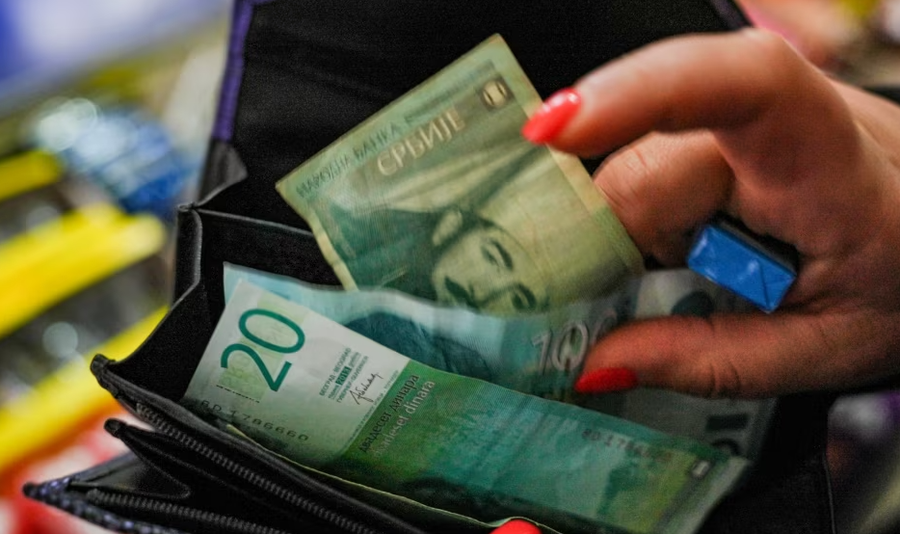
The regulation of the Central Bank of Kosovo that financial transactions be carried out only in euros has not achieved its goal, since the currency of Serbia, the dinar, still circulates in the Serbian areas of Kosovo and the revenues from the budget of Serbia are not converted into euros, says Radio Free Europe (REL), professor of economics at the University of Pristina, Mejdi Bektashi.
"This regulation was a hasty decision. A political decision of this Government", he thinks and adds that the issue of removing the dinar had to be resolved through the dialogue for the normalization of relations between Kosovo and Serbia, mediated by the European Union.
Bektashi emphasizes that even after a year from the approval of the regulation, there is no agreement on the transfer of money that would provide the Central Bank of Kosovo access to these funds.
The governor of the Central Bank of Kosovo (CBK), Ahmet Ismaili, commenting on this regulation at the annual conference at the end of December, said that it has had a "positive effect" on the entire financial sector, bringing "the unification of the sector and the interruption of illegal financing".
The regulation, which prohibits payments in currencies other than euros - therefore also in dinars - was approved at the end of December 2023 and entered into force on February 1, 2024.
Members of the Serbian community, who receive different incomes from the Serbian budget in dinars, reacted strongly to this regulation, while it was also criticized by the international community on the grounds that it could have negative consequences for minority communities.
Professor Bektashi says that the only thing that has changed during this year is that the citizens of Kosovo from the Serbian community must go to Serbia to receive their income in dinars.
"The transition period had to have a meaning, for the Central Bank of Kosovo and the People's Bank of Serbia to reach an agreement on the conversion of dinars to euros and to ensure the circulation of money for pensioners and others who receive income in dinars", considers Bektashi.
The People's Bank of Serbia has insisted that the issue of the dinar be discussed within the dialogue, which Kosovo has generally rejected, arguing that this is an internal issue.
What is the real situation on the ground?
Petar from North Mitrovica is an employee of one of the closed institutions that functioned according to the Serbian system, which Kosovo has closed on the grounds that they "functioned illegally".
In a conversation with Radio Free Europe, Petari says that he does not currently go to work, but receives his salary regularly.
"My salary is transferred to an account that is in dinars. Maybe this should also be resolved, so that the salary is somehow converted and we receive it normally in euros in Kosovo, through banks such as NLB Banka or Raiffeisen Banka, which are located in our city", he says this citizen.
He notes that "neither side wants to pay attention to the people who are going through difficulties".
The Central Bank of Kosovo has affirmed that the removal of financial transactions in dinars does not prohibit the payment of revenues from the budget of Serbia, but they must be exclusively in euros, to enable access to the flow of money.
However, to date, these revenues have remained in dinars. Also, in some Serbian areas - mainly in the municipalities in the north - the dinar continues to circulate as a means of payment in commercial establishments.
Official Belgrade refuses to close its institutions in Kosovo, and some of them have been transferred to border countries in Serbia. ATMs are also located there, from where the citizens of Kosovo withdraw their income in dinars.
"For dinars, in Serbia"
Radomir from Leposaviqi says that now, "as usual", he withdraws his income in dinars to Raska, a border town in Serbia, about 30 kilometers from this Serbian-majority municipality in northern Kosovo.
"We usually go there (to Raska) and buy Serbian products that were banned here (in Kosovo) for a period. We are used to paying by card... in general, it's not very simple, but we're getting used to it." he says.
He points out that long queues are created at the border points during the time when payments are made from the budget of Serbia, and they often have to wait for several hours to cross from Kosovo to Serbia or vice versa.
"You have to arm yourself with patience, because large crowds are created when pensions are paid or any other income. I have two pensioners (parents) in my family, I took them to Raska, but now I got an authorization and withdraw their pensions myself" , says Radomiri.
Miloradi from Graçanica, a municipality with a majority of Serbs near Pristina, until the dinar was abolished, received his pension by check, so the money was given to him at the counter of the Post Office that operated in the Serbian system or sent to his home address by the postman.
He explains that in the first months after the ban on the use of the dinar, he went to Serbia every month to withdraw his pension, but then he opened an account at the Serbian Postal Savings bank, where the money is transferred.
Now, as he says, he gives the bank card to his children, who withdraw his pension in Serbia.
Every year, Serbia allocates millions of euros for income payments to Serbs in Kosovo.
In addition to salaries and pensions, it also includes financial assistance such as social assistance, child allowances and the like.
At the end of October 2024, the Government of Serbia announced the territory of Kosovo as a "special social protection area", which provides for additional financial assistance for the unemployed, pensioners and children./ REL (A2 Televizion)







